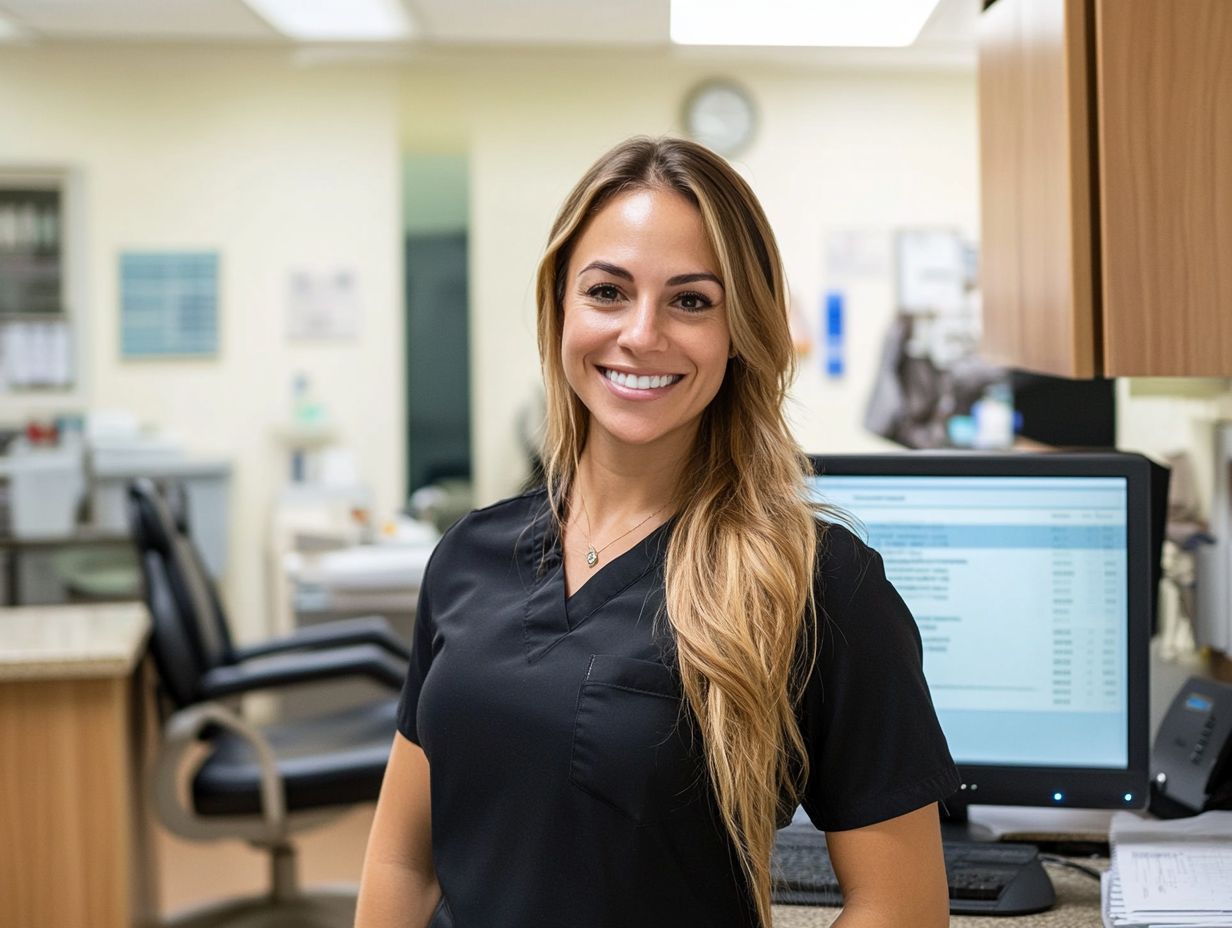HIPAA-Compliant IT Solutions for Greenville Dental Practices: Balancing Security and Patient Experience

Dental practices in Greenville face challenges. They must keep HIPAA compliance and provide a good patient experience.
This article reviews HIPAA regulations. It explains their impact on dental practices and the challenges local providers encounter.
We will present best practices for implementing these solutions. These practices ensure compliance and build patient trust.
Understanding HIPAA Compliance for Dental Practices

Dental practices in Greenville must understand HIPAA compliance. It helps manage patient data securely and meet regulatory requirements.
The Health Insurance Portability and Accountability Act (HIPAA) establishes critical standards for safeguarding health information, including electronic health records, which are vital for maintaining patient confidentiality and trust.
Compliance protects patient data. It also enhances the patient experience by managing health information carefully and meeting industry standards.
Overview of HIPAA Regulations and Requirements
HIPAA establishes a comprehensive framework of regulations and requirements that healthcare providers, including dental practices, must adhere to in order to ensure compliance and protect patient information.
This framework is anchored by various components, particularly the Privacy Rule, which governs how patient data is accessed and disclosed, ensuring that individuals retain control over their personal health information.
The accompanying Security Rule sets forth stringent protocols for safeguarding electronic data, requiring entities to implement adequate physical, administrative, and technical safeguards. Additionally, the Breach Notification Rule mandates that practices inform affected patients and authorities in the event of a data breach, thereby underscoring the importance of accountability.
Compliance with these regulations necessitates the development of robust security policies and effective management of electronic records. Furthermore, it emphasizes the critical need for ongoing compliance training and regular audits to uphold standards and mitigate risks.
Challenges Faced by Greenville Dental Practices
As healthcare technology advances, practices face risks. These risks include data breaches and cybersecurity threats.
Dental practices in Greenville encounter various challenges in maintaining HIPAA compliance, particularly in balancing the implementation of robust security measures with the provision of an exceptional patient experience.
As healthcare technology evolves, these practices must navigate a range of risks associated with data breaches and cybersecurity threats. The growing reliance on technology, including electronic health records and patient portals, requires continuous risk assessments to identify vulnerabilities and establish effective security frameworks, all while prioritizing patient engagement and satisfaction.
Balancing Security and Patient Experience

Dental practices can use technology solutions. These solutions improve usability and security simultaneously.
Balancing security and patient experience presents a critical challenge for dental practices, as they must effectively protect sensitive patient data while ensuring that their services remain accessible and user-friendly.
To navigate this intricate landscape, dental practices can leverage innovative technology solutions that enhance both usability and security simultaneously.
By incorporating robust encryption methods, they can safeguard patient information from unauthorized access while maintaining seamless access for authorized users. Implementing stringent access controls ensures that only designated staff have the ability to view or manipulate sensitive data. Coupled with effective user authentication processes, these measures significantly strengthen overall security.
This creates a strong defense against breaches. It also enhances the patient experience, allowing patients to use dental services confidently, knowing their data is secure and accessible.
HIPAA-Compliant IT Solutions for Greenville Dental Practices
To effectively navigate the complexities of HIPAA compliance, Greenville dental practices can utilize a range of HIPAA-compliant IT solutions that enhance data security and optimize operations.
These solutions ensure that all patient data, including medical records and electronic prescriptions, complies with HIPAA regulations.
Dental practices can reduce risks and enhance patient trust by using strong software solutions. These solutions focus on data integrity, workflow automation, and security assessments.
Key Features and Benefits of HIPAA-Compliant IT Solutions
HIPAA-compliant IT solutions offer key features and benefits that improve data privacy and patient safety for dental practices in Greenville. These solutions meet HIPAA requirements. They ensure that patient information is stored, accessed, and transmitted securely.
With capabilities such as encryption, secure user authentication, and comprehensive audit trails, these IT solutions not only safeguard sensitive patient data but also cultivate confidence and trust among patients.
They also include strong privacy audits. These audits check compliance and find vulnerabilities, allowing practices to fix issues quickly. Compliance training for staff ensures that all team members are knowledgeable about best practices for handling patient information, thereby fostering a culture of security.
These features greatly improve the patient experience by lowering the risk of data breaches and streamlining patient record management. By improving overall practice management, these IT solutions enable dental practices to concentrate on delivering quality care without the persistent concern of compliance risks.
Best Practices for Implementing HIPAA-Compliant IT Solutions

Dental practices must follow best practices for implementing HIPAA-compliant IT solutions. This helps ensure compliance and build patient trust.
This entails conducting thorough risk assessments, establishing robust security policies, and providing regular training for staff on HIPAA regulations.
Furthermore, practices should prioritize the development of comprehensive vendor management strategies to ensure that all third-party vendors comply with HIPAA standards.
This approach safeguards patient data and maintains adherence to data retention policies.
Steps to Ensure Compliance and Maintain Patient Trust
To follow HIPAA and maintain patient trust, dental practices must take consistent steps.
- To start, conducting regular security assessments is essential for identifying vulnerabilities and mitigating risks to patient information.
- Additionally, updating privacy policies ensures that both staff and patients are informed of their rights and the measures in place to protect sensitive data.
- Implementing comprehensive training programs for staff not only equips them with the necessary knowledge to handle patient information responsibly but also reinforces a culture of security within the practice.
These proactive measures protect patient data and improve the patient experience. They build confidence and satisfaction for those seeking dental care.
Frequently Asked Questions
1) What does it mean for an IT solution to be HIPAA-compliant?

Being HIPAA-compliant means that an IT solution meets the security and privacy requirements set by the Health Insurance Portability and Accountability Act. This means that the solution has been designed and implemented to protect sensitive patient information and ensure its confidentiality, integrity, and availability.
2) How can Greenville dental practices balance security and patient experience?
Greenville dental practices can balance security and patient experience by implementing IT solutions that are both secure and user-friendly. This can involve using encryption, access controls, and regular security audits, while also considering the ease of use for both staff and patients.
3) Are there specific IT solutions that are recommended for Greenville dental practices to ensure HIPAA compliance?
There is no single solution. Key IT solutions for Greenville dental practices to ensure HIPAA compliance are secure email systems, firewalls, data backup, disaster recovery plans, and secure data storage.
4) Is it necessary for Greenville dental practices to have a HIPAA compliance officer?
Dental practices do not need a designated HIPAA compliance officer. However, having one is highly recommended. This person oversees compliance with HIPAA regulations. They ensure all staff are trained and follow proper protocols.
5) Can Greenville dental practices use cloud-based IT solutions and still be HIPAA-compliant?
Yes, Greenville dental practices can use cloud-based IT solutions. They can still maintain HIPAA compliance. However, choose a cloud provider that offers HIPAA-compliant services. Sign a Business Associate Agreement (BAA) to protect patient information.
6) How can Greenville dental practices ensure their IT solutions comply with HIPAA regulations for patient access to their own health records?
Dental practices can comply with HIPAA by using secure patient portals. These systems let patients easily access their health records and important information. Additionally, train staff on procedures for handling patient requests for record access.




